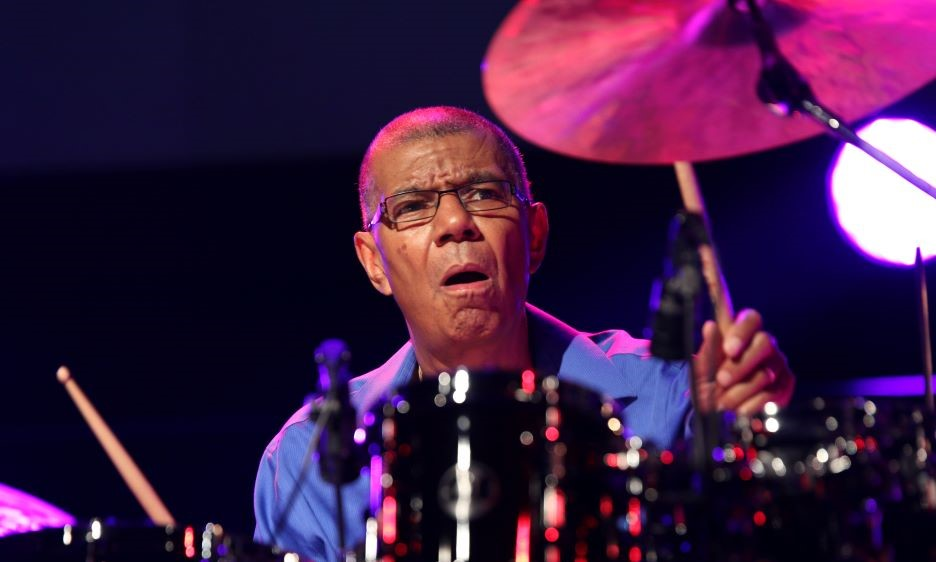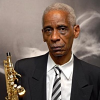Home »
Jazz Articles » Big Band in the Sky » Remembering Jack DeJohnette: Unlimited Imagination

Courtesy Oliver Abels
I think musicians have to be more courageous. It’s your voice, you know?
Jack DeJohnette
”
data-original-title=”” title=””>Jack DeJohnetteone of the most respected and influential of modern jazz drummers. He died of congestive heart failure on October 26, 2025. He was 83.
DeJohnette belongs in the pantheon of great jazz drummers. If there were a Mount Rushmore of jazz drummersand it would need to be one big old rockJack DeJohnette would certainly be there.
His unique and dynamic style incorporated elements of different eras of jazz, but also r&b and a drive that was closer to rock. No wonder
Miles Davis
trumpet
1926 – 1991
”
data-original-title=”” title=””>Miles Davis recruited DeJohnette for Bitches Brew (Columbia, 1970)a controversial and era-defining album that continues to make waves today.
In a 60-year career DeJohnette also played with
Charles Lloyd
saxophone
b.1938
”
data-original-title=”” title=””>Charles Lloyd,
Abbey Lincoln
vocals
1930 – 2010
”
data-original-title=”” title=””>Abbey Lincoln,
Betty Carter
vocals
1929 – 1998
”
data-original-title=”” title=””>Betty Carter,
Bill Evans
piano
1929 – 1980
”
data-original-title=”” title=””>Bill Evans, AACM founding members
Muhal Richard Abrams
piano
1930 – 2017
”
data-original-title=”” title=””>Muhal Richard Abrams and
Roscoe Mitchell
saxophone
b.1940
”
data-original-title=”” title=””>Roscoe Mitchell,
John Scofield
guitar
b.1951
”
data-original-title=”” title=””>John Scofield and
”
data-original-title=”” title=””>Dave Holland, among many others. On occasion he would sit in with the
Sun Ra Arkestra
band / ensemble / orchestra
b.1956
”
data-original-title=”” title=””>Sun Ra Arkestra during the band’s Chicago years.
His longevity and open-mindedness to music meant that DeJohnette’s collaborations happily straddled jazz’s generational mores and individual stylists. From
Jackie McLean
saxophone, alto
1932 – 2006
”
data-original-title=”” title=””>Jackie McLean and
Sonny Rollins
saxophone
b.1930
”
data-original-title=”” title=””>Sonny Rollins to
Wadada Leo Smith
trumpet
b.1941
”
data-original-title=”” title=””>Wadada Leo Smith and
Henry Threadgill
woodwinds
b.1944
”
data-original-title=”” title=””>Henry Threadgill, from
McCoy Tyner
piano
1938 – 2020
”
data-original-title=”” title=””>McCoy Tyner to
John Abercrombie
guitar
1944 – 2017
”
data-original-title=”” title=””>John Abercrombie, from
”
data-original-title=”” title=””>Pat Metheny to
”
data-original-title=”” title=””>Anouar Brahem and from
Bill Frisell
guitar, electric
b.1951
”
data-original-title=”” title=””>Bill Frisell to
Bruce Hornsby
piano and vocals
b.1954
”
data-original-title=”” title=””>Bruce Hornsby, DeJohnette’s agility and tireless inventionhe would tune the drums differently practically every timelit up every setting he graced.
Ever versatile and boasting formidable technique, DeJohnette was in many ways the perfect modern drummer. “I love to play grooves,” DeJohnette explained to All About Jazz in 2006. “Aside from swinging, and being abstract, I also love to be in the pocket and make a groove something substantial.”
His contributions to numerous one-off projects, several short-lived groups and recurring collaborations were certainly substantial.
Unquestionably, however, his most celebrated and enduring collaboration was in the
”
data-original-title=”” title=””>Keith Jarrett Triocommonly referred to as the Keith Jarrett Standards Trio. For over 30 years, beginning in 1983, Jarrett, bassist
Gary Peacock
bass, acoustic
1935 – 2020
”
data-original-title=”” title=””>Gary Peacock and DeJohnette wowed audiences around the world with their frequently sublime improvisational dialogs. Their studio recordings were rare, with around 20 live albums (at time of writing) a testament to the trio’s natural environment of the stage. For an insight into what made the trio tick, dive into Karl Ackerman‘s The Keith Jarrett Trio: Ten Essential Recordings.
Born in Chicago, Illinois, on August 9, 1942, the young DeJohnette was introduced to jazz by his uncle, disc jockey Roy Wood. The piano was DeJohnette’s first instrument, with the drummer telling All About Jazz in 2003 that
Ahmad Jamal
piano
1930 – 2023
”
data-original-title=”” title=””>Ahmad Jamal and his drummer
Vernel Fournier
drums
1928 – 2000
”
data-original-title=”” title=””>Vernel Fournier were early influences. “Ahmad Jamal was always ahead of his time,” DeJohnette noted.
Though DeJohnette played solo piano and the blues around Chicago’s South Side, it was saxophonist/organist
Eddie Harris
saxophone, tenor
1934 – 1996
”
data-original-title=”” title=””>Eddie Harris who persuaded DeJohnette he was a better drummer than a pianist. DeJohnette wanted to play both instruments, but upon moving to New York in 1966with the support of Muhal Richard Abramspianist/organist
Big John Patton
organ, Hammond B3
1935 – 2002
”
data-original-title=”” title=””>Big John Patton hired him as a drummer. From there DeJohnette never looked back. He later credited his piano studies as key to playing the drums in an orchestral manner.
Early ambition as a leader saw DeJohnette release The DeJohnette Complex (Milestone Records) in 1968. Nearly forty further albums under his own name would follow in the next five decades, including more than a dozen on Manfred Eicher’s ECM Records label. DeJohnette never ceased to experiment. On his own Golden Beams label DeJohnette released the solo album Music in the Key of OM (2005), a soothing ambient exploration that married synthesizer drone, custommade resonating bells and uncluttered improvisations based loosely on East Indian harmonies. The follow-up, Peace Time (Golden Beams, 2007) bagged DeJohnette a Grammy Award for Best New Age Album.
Throughout his career DeJohnette’s drum set up was key to his distinctive sound. In a 2011 interview with pianist
George Colligan
piano
b.1969
”
data-original-title=”” title=””>George Colligan (published at AAJ in 2013), DeJohnette spoke in detail about his approach to the drums: “I see myself as a colorist, not as a drummer, per se… I tune my drums in such a way so that no matter what I play, whatever I hit on it is a melody and that makes me think differently, it makes me think more melodically… the possibilities are only limited by your imagination.”
Colligan knew DeJohnette as well as anybody, having played in the drummer’s touring band for seven years. “Referring to Jack merely as a drummer is a massive understatement because he was transcendent of the drums,” Colligan told All About Jazz in the wake of DeJohnette’s passing.
“His drumming, of course, influenced countless drummers, but more importantly, he changed the way many musicians think about music. He changed how I think about music. Jack’s approach as a collaborator in improvised music created a setting where the soloist can literally go in any direction, and Jack helped you go wherever you want to go. He is the epitome of which all of us who play music should aspire to; being great on our instrument but being able to see the total picture and elevate the bandstand.”
So generous on the bandstand, it comes as no surprise that DeJohnette the man is remembered so warmly. “Jack was a genuinely humble and warm person,” Colligan expanded. “He really loved to connect with people. Jack and his wife Lydia welcomed me into their home like I was part of the family. I’m forever grateful to personally experience some of the magic of Jack DeJohnette. He will be missed. All of us are richer for Jack’s music.”
DeJohnette’s example should serve as a lesson to all aspiring jazz musicians who seek to follow this path. “I think the challenge for musicians is to have the courage to maintain their own voice,” DeJohnette told Colligan. “I think musicians have to be more courageous. It’s your voice, you know?”
Jack DeJohnette: August 9, 1942October 26, 2025
Tags
PREVIOUS / NEXT
Support All About Jazz

All About Jazz has been a pillar of jazz since 1995, championing it as an art form and, more importantly, supporting the musicians who make it. Our enduring commitment has made “AAJ” one of the most culturally important websites of its kind, read by hundreds of thousands of fans, musicians and industry figures every month.
Go Ad Free!
To maintain our platform while developing new means to foster jazz discovery and connectivity, we need your help. You can become a sustaining member for as little as $20 and in return, we’ll immediately hide those pesky ads plus provide access to future articles for a full year. This winning combination vastly improves your AAJ experience and allow us to vigorously build on the pioneering work we first started in 1995. So enjoy an ad-free AAJ experience and help us remain a positive beacon for jazz by making a donation today.


























